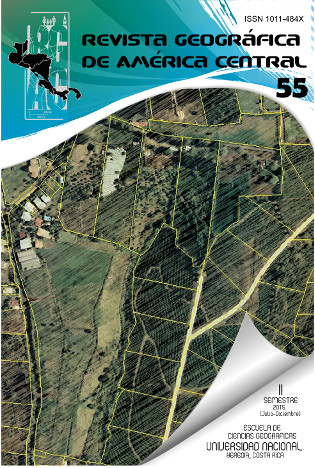WATER MANAGEMENT IN DISTRICT 011, THE WATERING MODULES OF ACÁMBARO AND SALVATIERRA, GUANAJUATO MÉXICO
DOI:
https://doi.org/10.15359/rgac.2-55.6Keywords:
Water handling, Irrigation techniques, Watering modules, GuanajuatoAbstract
Water management is essential for food production; therefore, this paper analyzes two irrigation modules -Acámbaro and Salvatierra, which belong to the irrigation district 011. The analysis shows the water use management, the different practices performed, the common problems, and the specific differences; consequently, the research was focused on key informants. The main issues faced by the irrigation modules are lack the of users’ awareness, little irrigation modernization, lack of land leveling programs, zero measurement of water given to each user, and abuse in extracting groundwater. All these problems seem to have a solution; the challenge is then to find appropriate mechanisms to implement these solutions.
References
Achkar, M. y Domínguez, A. (2008). La gestión del agua desde la geopolítica transnacional y desde los territorios de la integración. En La gestión de los recursos hídricos: realidades y perspectivas. Tomo I / editado por Denise Soares, Sergio Vargas y María Rosa Nuño. Jiutepec, Morelos: Instituto Mexicano de Tecnología del Agua; Guadalajara, Jalisco: Universidad de Guadalajara.
Aguilar, S., (1993). Regiones Agrícolas de Guanajuato. UACh. Chapingo, México.
Aguilar, S., Zepeda, J. y Sánchez, R. (2007). Caracterización del Uso de los Recursos Naturales en Guanajuato: El caso de la Región Acámbaro-Yuriria. UACh. Chapingo, México.
Canchola-Vega, M. (2013). Manejo de la Presa Solís. Comunicación personal. Supervisor de la presa Solís. Entrevista del 30 de abril de 2013, realizada por De La Cruz Ángeles Javier, en la Presa Solís, Acámbaro Guanajuato.
Caldera, A.R. y Torregrosa, M. (2010). Procesos políticos e ideas en torno a la naturaleza del agua: un debate en construcción en el orden internacional. En El agua en México: causes y encauses. Academia Mexicana de Ciencias, México D.F.
Domínguez, J. (2007). “La Gobernanza del agua en México y el reto de la adaptación en zonas urbanas: el caso de la Ciudad de México”. Anuario de Estudios Urbanos, UAM-Azcapotzalco, México D.F. Global Water Partnership (GWP). (2000). Manejo integrado de los recursos hídricos. Recuperado de http//www.cap-net-esp.org/wáter management_tool/document/43manejo-integrado.pdf
INEGI (2011). Censo agropecuaria del municipio de Acámbaro, Guanajuato. Aguascalientes, México.
Mandujano, M. (2013). Manejo y gestión de agua en el módulo de riego de Acámbaro. Comunicación personal. Secretario del módulo de riego de Acámbaro. Entrevista del 30 de abril de 2013, realizada por De La Cruz Ángeles Javier. Acámbaro Guanajuato.
Martínez, T. y Palerm, J. (editores). (1997). Antología sobre pequeño riego (vol. 1). Colegio de Postgraduados. Estado de México. ISBN 968 839 229 4.
Paneque, S., Corral, S., Guimarães, A., del Moral Ituarte, L. & Pedregal, B. (2006). Participative multi-criteria analisys for the evaluation for agua governance alternatives. A caso in the Costa del Sol (Málaga). Revista Ecologycal Economics 68, 16.
Rodríguez, C. (2008). La gestión del agua en los gobiernos locales de México. Documento de Trabajo núm. 41. Centro de Estudios Sociales y de Opinión Pública. México.
Rosas, R. (2013). “Manejo y gestión del modulo de riego Salvatierra. Presidente del consejo de administración del módulo”. Comunicación personal. Entrevista del 2 de mayo de 2013, realizada por De La Cruz Ángeles Javier, en Salvatierra, Guanajuato.
Rojas, S. (2012). Métodos para la investigación social. México D.F: Plaza y Valdés.
Sánchez, T., Darío, L. y Sánchez, A. (2004). Uso Eficiente del Agua. IRC (International Water and Sanitation Centre). Instituto de Investigación y Desarrollo en Agua Potable, Saneamiento Básico y conservación del Recurso Hídrico.
Vargas, S. (2007). La participación social en la política del agua. Aquaforum. España.
Virgil, I. (2013). “Manejo y gestión del módulo de riego Salvatierra. Funcionario técnico del módulo de Acámbaro. Comunicación personal”. Entrevista el 30 de abril de 2013. realizada por De La Cruz Ángeles Javier, en Acámbaro, Guanajuato.
Downloads
Published
How to Cite
Issue
Section
License
Proposed policy for journals offering Open Access
Authors publishing their works in the Journal acknowledge and agree to the following terms:
a) Authors retain the copyrights to their works and guarantee the Journal the right to be the first to publish their works, under the Creative Commons License Attribution-NonCommercial-ShareAlike 4.0 International, CC BY-NC-SA 4.0 International (https://creativecommons.org/licenses/by-nc-sa/4.0/deed.es), which allows others to share works upon complying with the acknowledgment of authorship and mention of the Journal as the original publisher of the work.
b) Authors are permitted to separately establish additional agreements for the non-exclusive distribution of the official edition of the work published in the Journal (for example, authors may desire to place the work in an institutional repository or incorporate it into a book that is to published elsewhere) so long they acknowledgment to recognize the Journal as the original publisher. The aforementioned additional agreements must respect the terms of the non-profit character and sharing philosophy of the original license (CC BY-NC-SA 4.0 International, https://creativecommons.org/licenses/by-nc-sa/4.0/deed.es).
c) Authors are encouraged to archive the post-print or editor/PDF version in Open Access repositories.






 REVGEO is licensed under https://creativecommons.org/licenses/by-nc-sa/4.0/deed.es
REVGEO is licensed under https://creativecommons.org/licenses/by-nc-sa/4.0/deed.es
.svg_4.png)

_(1).png)
_(1)_(1)_(1)_1.png)
(2)(1)(1)(1).png)
